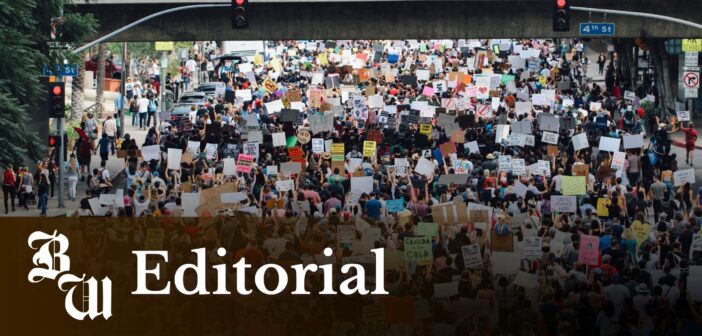After five months of deadlock, the Writers Guild of America has ended its strike. They announced their deal with The Alliance of Motion Picture and Television Producers to be “exceptional, with gains and protections for members in every sector of the business.”
We can’t help but think that a hostile culture around work environments and a growing determination to lead better, more fulfilling lives among young people has something to do with it.
Last spring, famed intellectual Noam Chomsky spoke to a crowd at Lehigh. His top concern was neoliberalism, the idea that the proliferation of free markets should mean minimal government oversight.
Chomsky has spent a decades-long career as a voice opposing this ideology. He’s advocated for progressive causes that seek to increase the rights and relative power of workers while dampening the ill effects that unfettered capitalism has on democracy.
Still, Chomsky has long been on the losing side of this battle.
And as a result of neoliberalism, he says there have been over “40 years of savage class war.” The destruction of unions, loss of productivity and wage theft were just some of what Chomsky touched on.
But what does that all mean?
For starters, without even following the news closely, it’s been hard to miss the recent uptick in major national strikes. A Labor Action Tracker from Cornell in 2022 found The Writers Guild of America and United Auto Workers are two of many unions contributing to over 300,000 on-strike workers this year.
President Biden, who’s made being pro-union part of his political brand, joined the ranks of the latter at a protest in Michigan.
After decades of bad-faith union busting weakening the power of the working class and executive lobbyists greasing the wheels of deregulations that widen the wealth gap even further, the pendulum appears to be swinging back in favor of labor.
Obviously, one hot-strike summer isn’t enough to undo the tangled web of neoliberal greed that Chomsky has been fighting since the ‘60s. But young Americans, especially Gen Z, are burdened with the weight of unaffordable education, housing and health care.
Gen Z is particularly responsive to labor efforts. According to Gallup, a global analytic firm focused on the intersection between work and life, 71% of Americans approved of labor unions in 2022.
In the years following the Great Recession, union activity — including strikes — has risen. But this isn’t surprising considering the bottom 99% of Americans continue to grow ostracized from the top 1%.
The wealth gap isn’t an illusive political term, it’s a reality.
According to the Economic Policy Institute, unequal wealth growth since the ‘70s is at a height last seen in 1928. With that, there are ramifications across the country in every state, community and industry. The rise of union activity is just one of them.
Fundamentally, the artists of the Screen Actors Guild wanted to emulate the job security of the pre-streaming era so that it’s still possible to maintain a career in the arts.
The Screen Actors Guild joined the writers this summer in striking, asking for similar demands of their industry.
“Guest actors on network TV used to get residuals. So our bank accounts are getting less and less. And yet the corporations and studios are getting richer and richer,” Young Mazino, star of Netflix’s hit show “Beef” said to Variety while protesting outside the streaming platform’s headquarters.
The WGA has presumably won many of their demands, including a 5% raise in salary minimums and increased residuals from streamers.
In the grand scheme, this is a small, albeit important, part of the emergence of global class consciousness. America isn’t alone in this either.
So as a new crop of Gen Z leaders start leveraging power in federal and private manners, is there hope for the future of labor laws in America? We think so.






Comment policy
Comments posted to The Brown and White website are reviewed by a moderator before being approved. Incendiary speech or harassing language, including comments targeted at individuals, may be deemed unacceptable and not published. Spam and other soliciting will also be declined.
The Brown and White also reserves the right to not publish entirely anonymous comments.
1 Comment
There are many good pro-labor voices in America – Noam Chomsky is not one of them, and him speaking at Lehigh is an embarrassment for the school
There are plenty of pro-worker speakers that can articulate the problems of the modern economic system more articulately than yelling at a nebulous boogeyman of “neoliberalism” AND can do it without denying genocides like it’s a competition